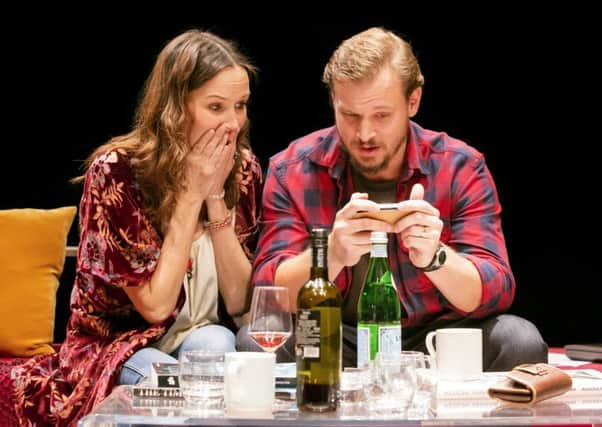Reviews: The Distance and Confirmation


Watching middle class problems surfacing to the fore of a bunch of middle class lives is not a recipe for theatrical success in a city like Sheffield.
In this brilliant studio theatre last year Bryony Lavery’s Queen Coal was brought to life and audiences saw a family, an ordinary family like the one you see in The Distance, deal with fractured relationships, as you see in The Distance. Queen Coal, a story of what happened when the miners’ strike rent families asunder, worked in Sheffield because it was the story of us. The story of Northern life. So why is that same space now hosting the story of a woman who has flown in from Australia, leaving her two children behind, to drink white wine and whine to her friends in a nice house in a suburb of London?
Advertisement
Hide AdAdvertisement
Hide AdThat is the question you might ask of this production, for a little while.
My bet is that it will then, at some point during the tale, turn its microscope on your own life and reveal its relevance to you. That’s what really brilliant writing can do – find universality along its two hours traffic of its stage.
On the surface of it Bea, played by Michelle Duncan on the edge of catatonia, is a selfish, privileged woman who has left her children in Australia. Her friends, the seriously irritating Kate and the forensically neurotic Alex have the kinds of lives where this sort of drama is needed to make them feel alive. Alex, for example, played with intense vulnerability by Charlotte Emerson, fabricates a terror that her child is caught up in the London riots – it is what drives her through the first two-thirds of the play. Turns out he’s listening to his iPod in his bed. Alex above all needs false drama to feel alive.
What elevates all of this are the performances and those little moments where you look on the stage, see a mirror and think “ah yes, me too”. That is both the risk and reward of putting stories like this on stage. They may seem insignificant until they are suddenly very significant.
Advertisement
Hide AdAdvertisement
Hide AdAn expertly directed piece of work, this is a piece for the head perhaps more than the heart, but well worth engaging with for the “ah yes” moment.
• To November 14.
Confirmation, West Yorkshire Playhouse, reviewed by Yvette Huddleston 4/5
We all like to think of ourselves as open-minded but when it comes to the crunch, how willing are we to take on board – or even begin to consider – the beliefs held by those with whom we fundamentally disagree?
That is the premise of Chris Thorpe’s Fringe First award-winning one-man show about confirmation bias – by which we select only the evidence we need to reinforce our own views – and it’s an intriguing mix of lecture, physical theatre and provocation.
Advertisement
Hide AdAdvertisement
Hide AdAt 85 minutes with no interval it is also an extraordinary tour de force that sees Thorpe reporting on research he has conducted including conversations with Jonathan Haidt, evolutionary psychologist and author of The Righteous Mind, with a Holocaust denier and – in the central dramatic conflict – with a racist known as “Glen” (not his real name).
This is a man who is the polar opposite to Thorpe – Glen’s attitudes are extreme; he sympathises with the actions of Anders Breivik, but he is also a socialist and a localist who lost his wife very young. So, says Thorpe, it’s complicated.
He prowls energetically around the stage disconcertingly switching characters from a version of himself to Glen, sometimes without warning and involving the audience by giving them some of Glen’s opinions to read out or squaring up to an individual to deliver a line face to face.
In this way Thorpe muses on whether it is possible to have an “honourable dialogue” with someone whose world view is so completely opposed to your own.
Advertisement
Hide AdAdvertisement
Hide AdNo-one is spared in this forensic examination of prejudice and fixed ideas, forcing the onlooker to confront their own in ways that are profoundly discomfiting. It is difficult to see whether there is any room for optimism here – even the show’s title suggests there is little likelihood of change – but as a theatrical experience it leaves an indelible mark.